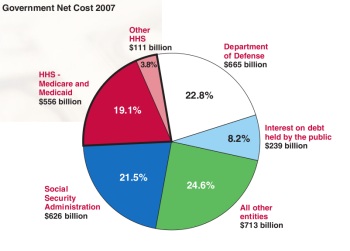My guest writer today on the Rickety blog is my Uncle Paul. We have been talking about the deficit and I present here some of Paul’s thoughts. He characterizes them as “musings” that are subject to discussion and not his final word.

Percentage Cuts
How to reduce the Federal deficit? Lopping off a percentage across the board is one strategy and used most of the time. I don’t prefer that type of approach because it may reduce programs that are performing for us. Moreover, when we make percentage cuts, the agencies simply cut the programs that hurt the electorate the most. Then there is a hue and cry until the public pressures legislators to restore the cuts or they pass a special levy to create a new program.
Paul’s maxim takes effect: “The demand for services rises to consume all available resources.” Programs came into effect one by one. Some do furnish services we need like law enforcement — not all law enforcement programs by the way should be kept. We can do without programs like D.A.R.E. as an example.
Reduce Unnecessary Services
Therefore, reducing unnecessary services dictates an examination of each program one by one to evaluate its efficacy. And, it dictates some honesty on our legislator’s part to deal with special interests. Of course, legislators are, for the most part, elected by special interests — teachers’ unions for instance. So it is up to the voters to remove ill performing legislators. Especially professional legislators. A big step in that direction would be to remove retirement benefits from the list of legislative benefits for elected officials. Our system of liberty demands citizen participants that rotate to refresh the body politic and intellect and who want to serve the public.
To evaluate efficacy, services need to be audited by an outside source who then reports to the legislature. Here in Washington, we passed an initiative from the people to create independent audits. The legislature had to be dragged by the heels screaming and kicking like some spoiled child. Some of us worked to promote independent audits for at least ten years. Results are promising but we need more time to evaluate how it is working.
Agency Function
One year, the Republicans in the legislature, in concert with a Democratic Governor (Gary Locke), approached the problem by forcing every agency to list their functions in terms of the agency priority. Then the Governor lopped off the lowest valued programs until his budget goals were met. That worked marginally O.K. but we are still left with the fact that agencies protect themselves first which doesn’t mean the public is necessarily served well by their evaluation.
If I were the legislature, I would cause the agencies to compete for funding instead of colluding to run up all their programs. When an agency must justify itself to survive, we get more information to work with in deciding which program is performing, intended, and worth funding.
Thanks for being my guest writer. I think the article turned out great. My family was discussing it Monday evening so I appreciate that you sparked their interest on this important topic. I hope you will be able to find time again soon to write for Rickety.
Great article! I agree. I think you make a wonderful point that “agencies protect themselves first” rather than enforce the mission they are fighting to protect: provide for the public. “The demand for services rises to consume all available resources” – brilliant! When we make more money, we usually spend more.
I understood that agencies do compete for funding, in some sense. Maybe you could expand on this? Thanks for the article.
All agencies compete for funding at some level. The money pot determines how much competition takes place.
In reality, agencies collude to gain a greater overall revenue stream. Any attempt by a legislator to break up the conspirators will bring forth a tirade from the agencies about how the person is creating conflict….
The truth of the matter is legislators have little time to examine all bills in detail. They get summaries of the bills, of course, but in general cannot learn very much about the bill before voting on it. Competition among agencies produces more information the legislator may use.
So the competition is not necessarily for funding. Funding happens based on the overall revenue stream while legislators vote on bills regardless. Understood. Thanks.
It has been talked about before but what about a federal constitutional amendment that mandates a balanced budget? That would restrict revenue. Utah mandates a balanced budget in its constitution. In lean years the budget is cut to meet projected revenue.
It always hurts to say “I can’t afford it.” The United States can either decide to feel that pain now, or have it forced upon us in the future.